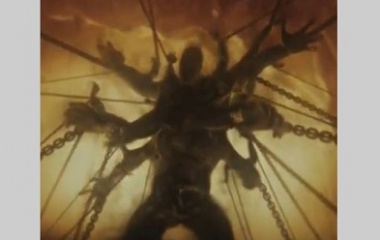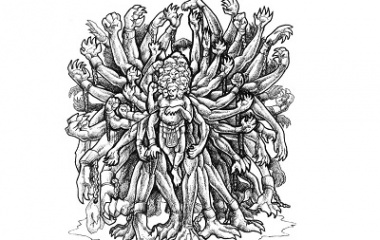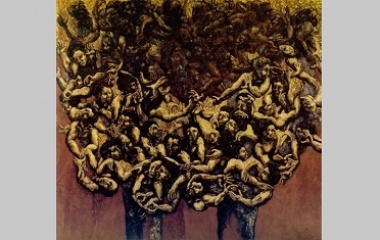- Pronunciation: Heck-uh-tawn-keeres
- Other Names: Hundred-Handed Ones, Hekatonkheires
- Origin: Greek
- Primary Location: Tartarus
- Role: Monsters; Children of Gaia
- Individuals: Briareus (Brigh-ar-uhs), Cottus (Coat-us), Gyes (jahy-eez)
Who are the Hecatonchires?
Like mortals, the gods could take each other as husband and wife, and would bear children. Sometimes though, a child could be born into the world as a terrible, misshapen form and be seen as a ‘monster’ by others, even their own parents. Such was the case with the Hecatonchires.
Mortals can see the helplessness of a newborn baby just by the way that the child cannot yet control its limbs or facial expressions; they see these motions as endearing, and cute even. Something about the baby’s helplessness is a part of what makes us want to care and nurture them. And the gods are no exception to this in life.
And like mortals, they too are also able to see a monstrosity when it is born, as was the case with the Hecatonchires. Picture not a normal baby with two flailing arms, but one with 100 quivering, shaking, and unmatched limbs. Added to this were 50 wailing heads with wide-open mouths, producing furious cries that shook Olympus itself. Imagine what would have normally been seen as adorable helplessness magnified and enhanced to a level never before seen, and realize the danger such a creature would pose to not only to others but also to itself.
Origin
In great pain, Gaia brought a trio of such horrors into the world.
The three newborn babies shrieked and wailed as never before heard in the heavens or on Earth. With their 100 hands and arms, and 50 heads, they would never be as graceful and godlike as her previous children.
Such a terrifying sight born to a mere mortal might be enough for them to drop the child into the sea for the waves wash away. However, the gods had their own ways of dealing with this kind of tragedy at birth. Gods, being immortal, could not be killed. But they could be shut away or imprisoned somewhere where they would never be seen or heard again, by mortals and gods alike.
Family
Before the tragedy of the Hecatonchires, Uranus and Gaia had been blessed with six sets of twins, each with their own natural attributes and grace, and each totally worthy of the gods. Uranus could only bestow upon this new triad of creatures a name that meant ‘hundred-handed ones’, the Hecatonchires. Gaia gave them names of their own: Briareus, the Vigorous; Cottus, The Furious; Gyes, the Big-Limbed. Uranus immediately tried to push these three forms back inside Gaia’s womb. If her pain in childbirth wasn’t enough, this new pain of having her offspring pushed back inside her drove her to new limits and she cried out. Uranus was deeply conflicted. He could not bear to see Gaia in such pain, but at the same time he could not bear to look upon or listen to these horrors either. Gaia bore them yet again, and for a few seconds, the twisted 50 faces of each baby lay still and quiet. She gazed upon them lovingly. To her, they were simply her children and she loved them just as much as her others before them.
History
The Imprisonment
The Hecatonchires lay still. Uranus furiously snatched them from Gaia’s grasp. “I will not accept these beasts! We are gods! We are perfection! These creatures can NEVER be a part of the heavens, they are a threat to us all!” he yelled.
Gaia begged him to reconsider but there was no way to sway him. As they left their mother’s arms, the Hecatonchires became enraged and cried even louder than before, swinging their many fists and flailing. The other gods clapped their hands over their ears. “Uranus! We cannot bear this noise any longer! You must release us from this torment!” they cried.
One by one, Uranus held the Hecatonchires over the mouth of the Pit of Tartarus.
And one by one, they fell. Plummeting deeper and deeper, their screams and wails diminished as they fell further and further, down into the darkness. The gods breathed a collective sigh of relief.
Time passed, but not in the same way as mortals perceive. At first, all the Hecatonchires could do was helplessly flail around in the dark. They could not control their limbs or their rage and vicious fury. They couldn’t be nourished by the mother’s love they had been wrest from, so instead they fed upon their violence and anger, becoming more and more monstrous with each passing minute. But a minute to a god is not the same as a minute to a mortal. The children grew very quickly, deep inside their dark prison with its high walls of bronze.
Finally, one day, they heard a voice at the mouth of the pit calling to them.
Freedom and Betrayal
“BROTHER! FREE US!” cried the 150 heads in unison. It was the first time they had ever said anything together, the first time they ever worked in collective thought. The idea of freedom pushed them to focus, and silence their violent thoughts.
At the mouth of the pit stood their brother, Kronos. He had made a vow to his mother to release his siblings, but they were so very far down into the pit. He could not see them, and could only hear their voices. The Hecatonchires were aware that they could not be seen, and worked even further to disguise their monstrous forms. With great effort, they spoke in unison, slowly and softly.
“Free us, brother. We are in great pain. We are in such grief. We have not seen light since our birth. Free us, and you will be rewarded. Free us, and you will be glorified.”
Kronos knew what he had to do. Quickly, he slashed at his father, Uranus, with a sickle, emasculating him. He took the key to the gate from Uranus, watched as he crept away in pain and defeat, and then went back to the pit to free his long lost brothers.
The gate swung open. Out from the pit burst the three monsters. They had learned to control their voices, but still had not mastered the use of their limbs. They savagely swung their fists, twisting and turning in a macabre dance of death. Kronos’ mouth gaped widely at these unbelievable creatures. THESE were his brothers? NO! It couldn’t be possible! He had never seen them before and they had spoken so softly to him. What deception was this? Soon the danger became obvious to him and he knew: for the sake of the heavens, he could not keep his promise to his mother. The Hecatonchires were so strong, they savagely beat him hard with their limbs and struggled as he tried to re-cage them. But one by one, he was able to grasp them. And one by one, they fell back again, into the darkness and despair. One last cry in unison as they fell, but this time a moan of despair rather than a whisper of victory.
Redemption
“BETRAYED!! WE ARE BETRAYED!” they wailed. “If only we could control our limbs!” They would need to learn to do more than that in order to gain their freedom, though. Ultimately, they would need to master their rage. No matter how they tried, for a while all they could do was smack their hands against the bronze walls of their prison. Their first attempts were a collection of jumbled, random movements as they slammed their fists into the walls and each other. Then they began to concentrate. They would move 20 limbs at a time. Then 10. Then 5. With nothing but time on their many hands, they would practice agonizingly. Eventually, they mastered fluid movement of several limbs at once. They had to work to a point where they could move each limb independently, and had begun to concentrate greatly on this effort. One arm. Up and down. Left and right. Side to side. Their concentration brought control, not only of their limbs, but of their fury as well.
Eventually, another voice rang out at the entrance of the pit. It was Zeus, and for a moment the Hecatonchires thought they would lose all of their progress as their rage surfaced once again. Unlike his father Kronos, Zeus had been told about these monsters in the pit and how out of control they were.
“Brothers! I seek your help in battle, and for your services, I will set you free. But beforehand, you must prove that you have mastered the use of your limbs as well as your rage. Save your rage for the coming battle. I give you three tasks to prove yourselves worthy of your freedom.”
“First,” he said, “you must wrestle and defeat the dragon, Campe, who guards your prison.”
“Second, you must hurl a boulder from the entrance of the pit up to the highest point of Olympus,” declared Zeus, pointing to the heavens.
“And third, you must locate and aid the Cyclopes within Tartarus and help them to forge mighty weapons to defeat our father, Kronos.”
Cottus, “The Furious,” stepped forward as Campe lurched towards him while breathing fire in a large swirling flame. Using 30 of his limbs, Cottus tore a portion of bronze from the wall and shielded himself from the fire. He leaped forward, pummeling the dragon with 30 limbs, and seizing it by the neck with the remaining 40. With ease, he flipped the dragon onto its back, then took the shield of bronze and shoved it down into the dragon’s throat. The dragon wheezed, unable to breathe, then thrashed, shuddered, and succumbed to death.
Gyes, “The Big-limbed,” reached down and with all of the strength of his many arms, lifted the largest boulder he could find. He brought the boulder up to his chin, and with the grace of an Olympian discus athlete, sent the massive rock up into the air. Up it went, until the Hecatonchires could no longer see it, where it lodged upon the highest summit of Olympus.
Briareus, “The Vigorous,” had mastered the use of his limbs better than any of them. Zeus threw a hammer, ingots of godly metal, and an anvil down into the pit. Briareus took these and quickly found his other brothers, the Cyclopes, who had not been noticed by the Hecatonchires because they had previously been so blinded by their own rage and their intense work to control their own bodies. Clang! Clang! Soon, thunderbolts were created, as a blacksmith would forge a mighty blade, ready for Zeus to hurl in battle. Next, came an enormous trident that would help Poseidon summon the power of the sea. And finally, with the memory of betrayal fresh in his mind, Briareus helped forge a helmet of darkness for Hades, to give the gods the covert advantage of being hidden from the eyes of Kronos in the coming battle. The earth shook with the efforts of the Hecatonchires and the Cyclopes as they worked together on this final task.
Zeus beamed at the Hecatonchires, admiring the craftsmanship and power in the weapons that were presented to him. He also understood that their rage was controlled well enough to not only work with one another, but with others as well. “My brothers! You have done well! I release you from your prison. Let us go forth allied together and restore the glory of the gods in the greatest battle of all time!” cried Zeus.
The Hecatonchires emerged from the pit again. Only this time it was not with a savage and uncontrolled dance, but with amazing precision and mastery of their limbs, their wills, and their voices. They were no longer ruled by their own rage and had freed themselves not just from the confines of their prison, but also from their own violent natures.
Current Influence
The Hecatonchires hurled 300 stones at a time at the Titans who were allied with Kronos. Soon enough, they handed Zeus his victory and were rewarded not just for their victory in battle, but also for their victory over their own savagery and disability. Briareus would go on to negotiate a dispute between Poseidon and Helios, restoring order between the sea and the sun. Poseidon offered his daughter to Briareus in marriage, and gave him a palace beneath the Aegean Sea. Briareus would also later rescue Zeus from a coup staged by Poseidon, Hera, and Athena; his mere presence alongside Zeus was enough to stop an overthrow from happening.
Cottus and Gyes would go on to become the guards of Tartarus, for they knew the prison of the gods better than anyone. They were also granted palaces under Oceanus, the earth-encircling source of all water.
And to this day, whenever an earthquake strikes, it is thought by those who still worship the gods to be caused by the many limbs of the Hecatonchires.











this is really cool thx
This helped a lot for my project.
Section: “Who are the Hecatonchires?”
Paragraph 3, sentence 3 asks us imagine their cries shaking Olympus but should read Mount Othrys. Urinus stuck those babies back in Gaia and in doing so lost his shot at dad of the year.
correction: *Uranus
To elaborate, their cries probably shook Olympus too, but nobody was there to hear it as the third wave gods hadn’t been born much less set up shop on the new mountain. Uranus made so many horror babies but the Hecatonchires would definitely make his Greatest Hits album. Then he passed the horror baby torch to his horror baby Typhon who went on to have his own hall of fame horror baby making career.
correction #2: Tartarus was the father of Typhon, not Uranus. That is according to Hesiod’s genealogy.
john deere 310l ep backhoe loader – john deere dh5510 rigid single offset disk with 18 blades, john deere i dig dirt tervis tumbler